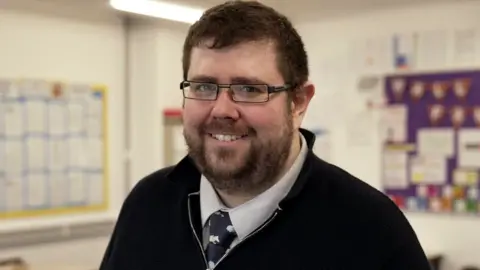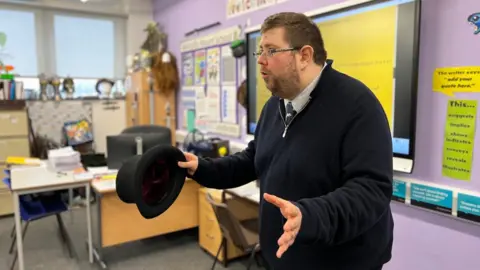NEU teacher strikes: 'We have to take action’

 BBC/Gemma Laister
BBC/Gemma LaisterSchools in England and Wales will face disruption in the first of a series of teacher strikes over pay on Wednesday. As teachers weigh up the cost of striking, parents and businesses are grappling with the uncertainty caused by potential school closures.
At 7am every day Dan Quirk arrives at Whitcliffe Mount School, a large secondary school in Cleckheaton, West Yorkshire. He leaves at 6pm, just before the doors are locked.
The head of English worked in the private sector for almost a decade - mainly as an estate agent - before training as a teacher. He says despite his school generally managing workload well, the pressures he faces as a teacher are like no other job he's had.
"It's all-consuming," he tells me. "You are a teacher 24 hours a day during term time."
Like many teachers, it is the workload as much as pay that has tipped Dan over the edge to vote to go on strike with his union, the NEU, on several dates in the coming weeks.
Dan's classroom is lined with various hats and costumed mannequins - including a suit of armour and the chainmail of a medieval knight - to help bring characters the pupils are studying to life.
He tells me teachers don't feel valued for the "blood, sweat and tears" they put into helping young people achieve.
Dan, who's 39, says he makes "a thousand mini-decisions" responding to the 150 pupils he sees each day - from enforcing uniform and behaviour to spotting safeguarding issues.
Teachers spend so much time sorting out these problems that work can easily spill into their home lives.
Lesson planning, marking and keeping up-to-date with his subject, mean Dan regularly has to work at weekends.
 BBC/Branwen Jeffreys
BBC/Branwen JeffreysDan says he doesn't think he'd ever leave teaching - he's "exhausted, but happier" than he was in the private sector - but he fully understands why so many of his colleagues are leaving.
Workload is one of the reasons many schools are reporting difficulties with recruiting and keeping teachers. Last year only 59% of the target numbers started training to be secondary school teachers, down from 79% the previous year.
These numbers are a key reason that Dan is striking.
"It's not about a selfish demand for higher pay - it's about what will happen if we don't have that improvement to recruitment numbers, to retention numbers," he says. "We are losing teachers faster than we're recruiting them, and that can't continue."
Striking teachers are demanding a pay rise that is above inflation and is funded by the government, rather than coming from schools' existing budgets.
Experienced teachers like Dan have seen their pay fall by 13% since 2010 in real terms, according to independent economists.
Dan is near the bottom end of the pay scale for the most experienced teachers, which starts at just over £40,000. That can be topped up with payments of between £3,000 and £8,000 for teachers who take on extra responsibility - such as being a head of subject or year.
It is only the pay for those starting teaching which is likely to keep up with inflation, as it will rise to £30,000 in the next school year.
As with strikes by nurses, train drivers and postal workers, teachers going on strike has a huge knock-on impact.
On a small industrial estate near Heckmondwike, 29-year-old Danyelle Hughes says uncertainty about school closures is the greatest challenge the strikes pose to her small cleaning business.
Many schools won't know exactly how many teachers are striking until the day itself - so head teachers might not be able to decide until Wednesday morning whether or not to keep the school open.
Danyelle makes her business work around school hours, so that she and her colleagues don't have to pay extra childcare costs for their children.
"If the schools do shut, we won't have any childcare and won't be able to work," she says. "It's not exactly a job we can do from home, or drag our children round to people's homes."
 BBC/Branwen Jeffreys
BBC/Branwen JeffreysIn the sofa corner of the small office at Diamond D's Cleaning, there is a bookshelf with children's games where Danyelle says her own children, 10-year-old Oliver and eight-year-old Millie, might have to spend their day.
Danyelle doesn't want to cancel jobs, because she worries clients will think her service is unreliable - but her workers might need to use annual leave or take an unpaid day off if their children's schools close. Self-employed workers may just pay for childcare to allow them to work.
"The way the world is at the moment, and the price of everything going up, it is quite worrying for them," Danyelle says.
While Danyelle sympathises with teachers facing rising costs, she also feels her children have "already missed enough" education as a result of the disruption caused to schools during the pandemic.
At a time when so many are struggling financially, Dan says it's "definitely a risk" that teachers could lose public support by going on strike.
But he says that is outweighed by "the risk of not taking action" to address the shortage of quality teachers, which could lead to a generation of children "left behind without the education that they need".
He says joining the picket line as his pupils walk past him - assuming the school can stay open - will be a tough moment.
"Knowing you're not there for them will be difficult," he says. "The last time that we took industrial action... we were greeted with quite a lot of support. If that's not the case, then I can imagine [teachers] will become even more despondent."
Additional reporting by Sallie George.

Have you been affected by issues covered in this story? Get in touch by emailing [email protected].
Please include a contact number if you are willing to speak to a BBC journalist. You can also get in touch in the following ways:
- WhatsApp: +44 7756 165803
- Tweet: @BBC_HaveYourSay
- Upload pictures or video
- Please read our terms & conditions and privacy policy
If you are reading this page and can't see the form you will need to visit the mobile version of the BBC website to submit your question or comment or you can email us at [email protected]. Please include your name, age and location with any submission.
